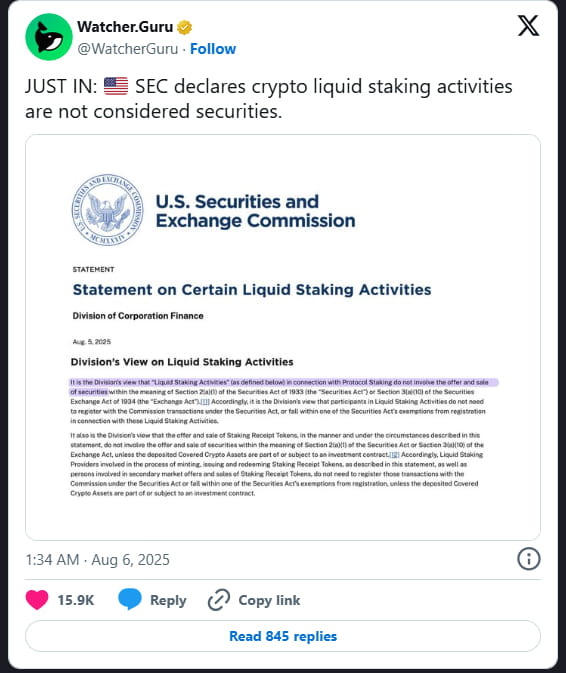Author: Jaxon Gaines
Compiled by: Deep Tide TechFlow
The U.S. Securities and Exchange Commission (SEC) stated on Tuesday that cryptocurrency liquid staking activities are not considered securities activities.
The SEC has repeatedly issued statements supporting cryptocurrencies, and the latest statement further enhances the SEC's transparency regarding cryptocurrency staking.

The SEC's statement reads:
The department believes that the 'liquid staking activities' related to protocol staking do not involve the issuance and sale of securities as defined by Section 2(a)(1) of the Securities Act of 1933 ('Securities Act') or Section 3(a)(10) of the Securities Exchange Act of 1934 ('Exchange Act'). Therefore, the department concludes that participants in liquid staking activities are not required to register these transactions with the SEC under the Securities Act, nor do they fall under the registration exemptions related to these liquid staking activities as specified by the Securities Act.
This statement provides clear guidance for participants in the liquid staking space, ensuring that such activities are not subject to the regulatory framework typically applicable to securities. SEC Chair Paul Atkins stated in a release: 'The staff statement on liquid staking published today is an important step forward in clarifying the staff's view on crypto asset activities that are not within the SEC's jurisdiction.'
The department also believes that the provision and sale of staking receipt tokens as described in this statement do not involve the offering and sale of securities within the meaning of Section 2(a)(1) of the Securities Act or Section 3(a)(10) of the Exchange Act, unless the deposited assets covering the crypto assets are part of or subject to an investment contract.
Therefore, liquid staking service providers (as described in this statement) involved in the process of minting, issuing, and redeeming staking receipt tokens, as well as individuals participating in the secondary market for providing and selling staking receipt tokens, are not required to register these transactions with the SEC under the Securities Act, nor are they bound by the registration exemptions of the Securities Act, unless the deposited assets covering the crypto assets are part of or subject to an investment contract.
Earlier today, the U.S. Securities and Exchange Commission (SEC) classified stablecoins as cash.
In the months following the return of current U.S. President Donald Trump, the regulator changed its tone towards the cryptocurrency industry.
According to a press release issued on Friday, the SEC's cryptocurrency working group plans to hold multiple 'cryptocurrency roundtables' across the United States. The SEC's latest guidance is also consistent with the (GENIUS Act) signed by Trump in July. This act formally recognizes regulated stablecoins as cash, a new financial instrument that is neither a security nor a commodity.
